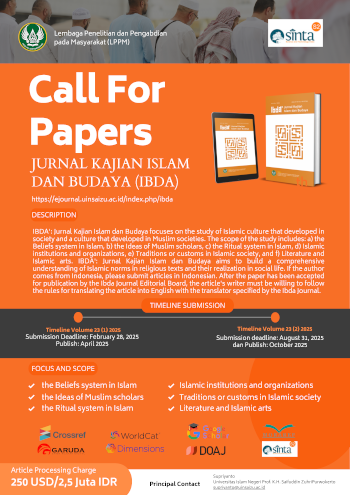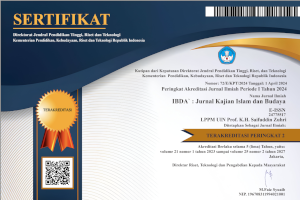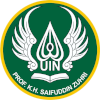The Concept of Ukhuwah Wathoniah in the 12 Gurindam Poems by Raja Ali Haji
DOI:
https://doi.org/10.24090/ibda.v20i1.6668Keywords:
ukhuwah wathoiniah, culture studies, national integrity, hermeneutics, Malay cultureAbstract
This study explains the values of ukhuwah wathoniah in the poem Gurindam 12 by Raja Ali Haji. Researchers used a literature review method with three steps. First the exploration of Malay cultural texts related to ukhuwah wathoniah, and data collection through the internet, libraries, and scientific dialogues with experts. The second, uncover the meanings of the essential phrases found in Gurindam 12. The third, constructs the values found. The study's results found that the values of ukhuwah wathoniah in Gurindam 12 contain fundamental values, practical operational values, and reflective meta-values. The fundamental values in building ukhuwah wathoniah are; knowledge, nobility, language, the goal is happiness and glory. In practical operational values, one can understand textual and contextual issues, issues of humanity and unity, and issues of justice and welfare. The Meta-Reflective Approach Gurindam 12 values can be reflected in building nationalism in the era of Industry 4.0. In conclusion, the values of ukhuwah wathoniah are relevant to understanding the phenomenon of the Unitary State of the Republic of Indonesia as a country. This originated from a sense of togetherness of nations in the post-colonial archipelago of the Dutch East Indies and continues to grow to achieve common goals. Cultural works reflect the creativity of generations in their time. Thus, Raja Ali Haji's Gurindam 12 complements the Language Manual, which was used as a guide in the Sumpah Pemuda (Youth Oath) of October 28, 1928, to promote Malay as the national language of Indonesia. The rise and fall of Indonesia-Malaysia relations can be understood in the context of ukhuwah wathoniah and ukhuwah Islamiah.Downloads
Download data is not yet available.
References
Beckley, M. (2010). Economic development and military effectiveness. Journal of Strategic Studies, 33(1), 43–79.
Belzen, J. A. (2019). What, why and how? Meta-Reflections on Cultural Psychological Approaches to the Scientific Study of Phenomena Called Religious. Integrative Psychological and Behavioral Science, 53(1), 158–187.
Buil, I., De Chernatony, L., & Martínez, E. (2012). Methodological issues in cross-cultural research: An overview and recommendations. Journal of Targeting, Measurement and Analysis for Marketing, 20 (3–4), 223–234.
Connolly, T. (2020). Fundamentals of comparative and intercultural philosophy. Contemporary Political Theory, 19(S2), 157–160.
Geertz, C. (1973). The interpretation of cultures . selected essays LK. Basic Books. Inc New York, 470.
Halkis, M. (2017). Konstelasi Politik Indonesia. Jakarta; Yayasan Obor Indonesia
Hinton, M. (2021). Corpus Linguistics Methods in the Study of (Meta)Argumentation. Argumentation, 35(3), 435–455
Mechthild Bereswill, C. M. and P. R. (2010). Alfred Lorenzer and the depth-hermeneutic method. Psychoanalysis, Culture & Society, 15(3), 221–250.
Muh. Wajedi Ma’ruf. (2020). Ukhuwah dalam Al-Qur’an dan Implementasinya dalam Pendidikan Islam. Dirasat Islamiah: Jurnal Kajian Keislaman, 1(2).
Mulcahy, K. V. (2017). Public Culture, Cultural Identity, Cultural Policy Comparative Perspectives. Louisiana State University. Palgrave Macmillan.
Pereira da Silva, V. (2020). Culture of the Constitution and the Culture in the Constitution BT - Encyclopedia of Contemporary Constitutionalism (J. Cremades & C. Hermida (eds.); pp. 1–23). Springer International Publishing.
Reditya, T. H. (2022). Mahathir: Malaysia Harus Klaim Kepulauan Riau dan Singapura. https://www.kompas.com/global/read/2022/06/21/130000970/mahathir--malaysia-harus-klaim-kepulauan-riau-dan-singapura
Sherril Dodds. (2011). Dancing on the Canon Embodiments of Value in Popular Dance. Palgrave Macmillan.
Storey, J. (2018). Cultural Theory and Popular Culture An Introduction. In University of Sunderland (Fifth). Pearson Longman.
Tran, S. K. (2017). Google: a reflection of culture, leader, and management. International Journal of Corporate Social Responsibility, 2(1).
Tudor M.E., Pumaccahua T.T., Pritchard B.A., Kaufman J.C. (2011) Creativity. In: Goldstein S., Naglieri J.A. (eds) Encyclopedia of Child Behavior and Development. Boston, MA; Springer,
Belzen, J. A. (2019). What, why and how? Meta-Reflections on Cultural Psychological Approaches to the Scientific Study of Phenomena Called Religious. Integrative Psychological and Behavioral Science, 53(1), 158–187.
Buil, I., De Chernatony, L., & Martínez, E. (2012). Methodological issues in cross-cultural research: An overview and recommendations. Journal of Targeting, Measurement and Analysis for Marketing, 20 (3–4), 223–234.
Connolly, T. (2020). Fundamentals of comparative and intercultural philosophy. Contemporary Political Theory, 19(S2), 157–160.
Geertz, C. (1973). The interpretation of cultures . selected essays LK. Basic Books. Inc New York, 470.
Halkis, M. (2017). Konstelasi Politik Indonesia. Jakarta; Yayasan Obor Indonesia
Hinton, M. (2021). Corpus Linguistics Methods in the Study of (Meta)Argumentation. Argumentation, 35(3), 435–455
Mechthild Bereswill, C. M. and P. R. (2010). Alfred Lorenzer and the depth-hermeneutic method. Psychoanalysis, Culture & Society, 15(3), 221–250.
Muh. Wajedi Ma’ruf. (2020). Ukhuwah dalam Al-Qur’an dan Implementasinya dalam Pendidikan Islam. Dirasat Islamiah: Jurnal Kajian Keislaman, 1(2).
Mulcahy, K. V. (2017). Public Culture, Cultural Identity, Cultural Policy Comparative Perspectives. Louisiana State University. Palgrave Macmillan.
Pereira da Silva, V. (2020). Culture of the Constitution and the Culture in the Constitution BT - Encyclopedia of Contemporary Constitutionalism (J. Cremades & C. Hermida (eds.); pp. 1–23). Springer International Publishing.
Reditya, T. H. (2022). Mahathir: Malaysia Harus Klaim Kepulauan Riau dan Singapura. https://www.kompas.com/global/read/2022/06/21/130000970/mahathir--malaysia-harus-klaim-kepulauan-riau-dan-singapura
Sherril Dodds. (2011). Dancing on the Canon Embodiments of Value in Popular Dance. Palgrave Macmillan.
Storey, J. (2018). Cultural Theory and Popular Culture An Introduction. In University of Sunderland (Fifth). Pearson Longman.
Tran, S. K. (2017). Google: a reflection of culture, leader, and management. International Journal of Corporate Social Responsibility, 2(1).
Tudor M.E., Pumaccahua T.T., Pritchard B.A., Kaufman J.C. (2011) Creativity. In: Goldstein S., Naglieri J.A. (eds) Encyclopedia of Child Behavior and Development. Boston, MA; Springer,
Downloads
Published
2022-07-06
How to Cite
Halkis, M., & Sudardi, B. (2022). The Concept of Ukhuwah Wathoniah in the 12 Gurindam Poems by Raja Ali Haji. IBDA` : Jurnal Kajian Islam Dan Budaya, 20(1), 44–61. https://doi.org/10.24090/ibda.v20i1.6668
Issue
Section
Articles
License
Authors who publish with this journal agree to the following terms:
- Authors retain copyright and grant the journal right of first publication with the work simultaneously licensed under a Creative Commons Attribution-ShareAlike License a that allows others to share the work with an acknowledgement of the work's authorship and initial publication in this journal.
- Authors are able to enter into separate, additional contractual arrangements for the non-exclusive distribution of the journal's published version of the work (e.g., post it to an institutional repository or publish it in a book), with an acknowledgment of its initial publication in this journal.
- Authors are permitted and encouraged to post their work online (e.g., in institutional repositories or on their website) before and during the submission process, as it can lead to productive exchanges, as well as earlier and greater citation of published work (See The Effect of Open Access).















